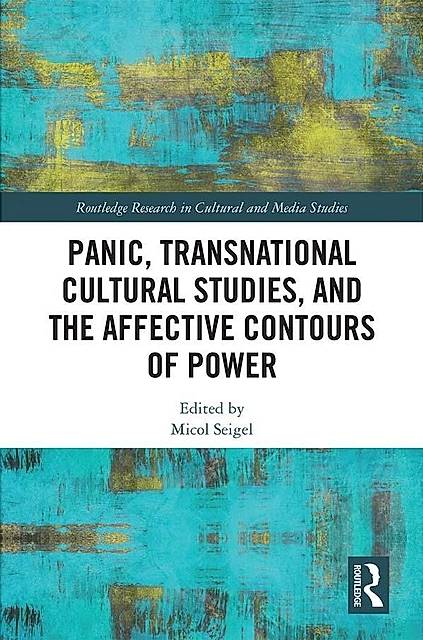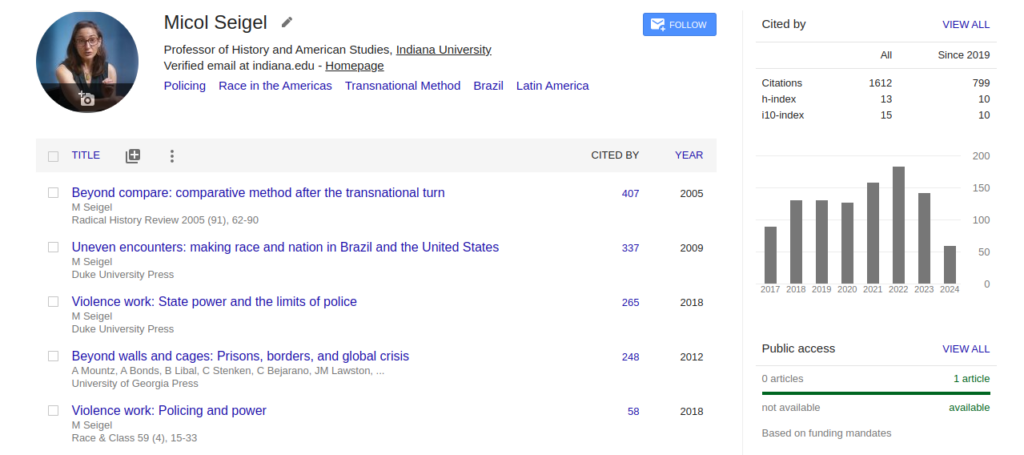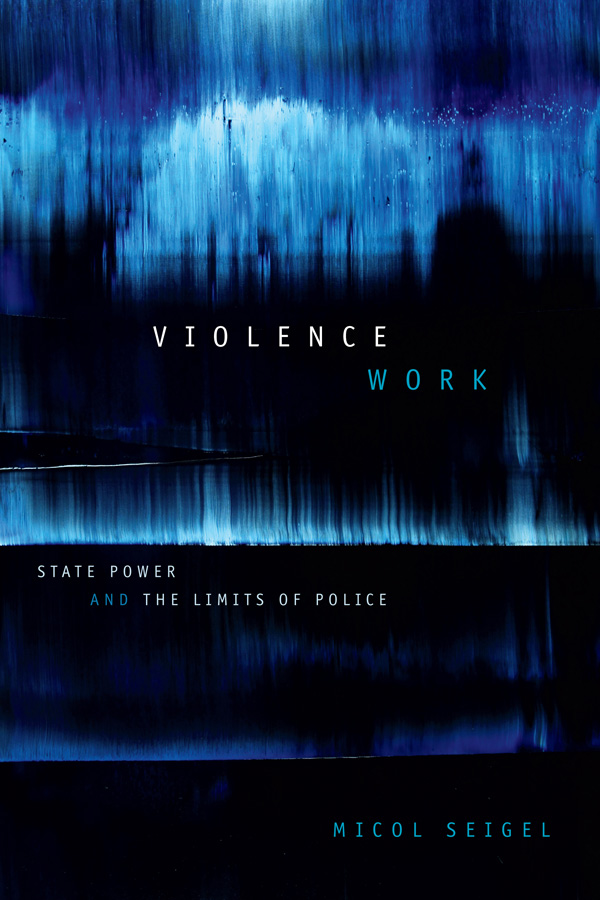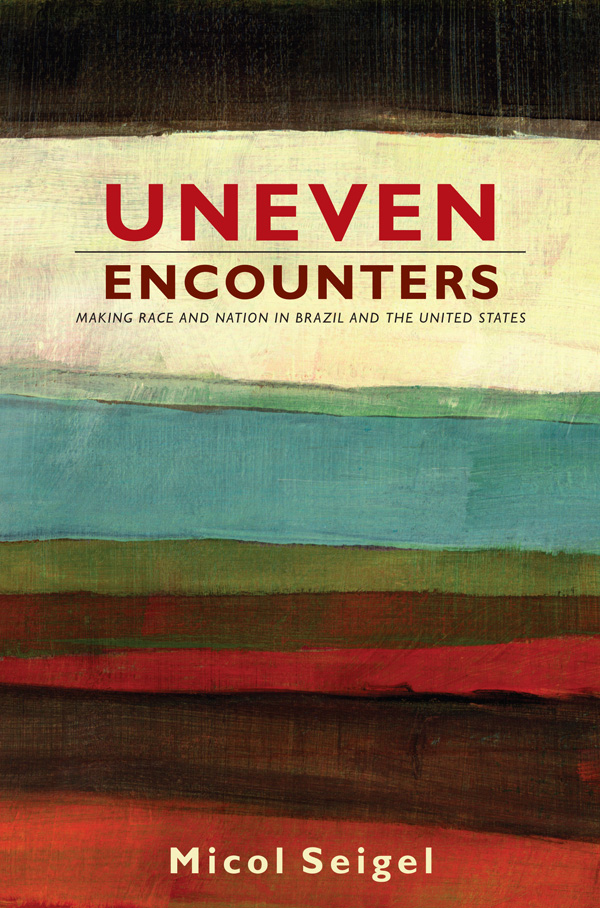Scholarship
Featured Publications:
“Hypothecation: Debt Bondage for the Neoliberal Age,” Transition 114 (2014): 134-145.
Who Would Believe a Prisoner? Indiana Women’s Carceral Institutions, 1848–1920 (editing and research guidance)
More Featured Publications
- “Places without Police: Brazilian Visions,” Radical History Review no. 137, special issue on “Policing, Justice, and the Radical Imagination,” edited by Monica Kim, A. Naomi Paik, and Amy Chazkel (2020): 177-192.
- “Nelson Rockefeller in Latin America: Global Currents of U.S. Prison Growth,” Comparative American Studies 13, no. 3 (September 2015): 161-176.
- “Convict Race: Racialization in the Era of Hyperincarceration,” Social Justice 39, no. 4 (April 2014): 31-51.
- “William Bratton in the Other LA,” Beyond Walls and Cages: Bridging Immigrant Justice and Anti-Prison Organizing in the United States, ed. Jenna Loyd, Matt Mitchelson & Andrew Burridge (AK Press, 2012), pp. 115-125; reprinted from Without Fear…Claiming Safe Communities Without Sacrificing Ourselves (Los Angeles: Southern California Library, 2007), pp. 54-62.
- “Brazil and the U.S.: Comparable or Connected? Black Citizens and their States in 1920s São Paulo and Chicago,” in Extending the Diaspora: New Scholarship on the History of Black Peoples, ed. Darlene Clark Hine and the Diaspora Paradigms Committee (Illinois, 2009), pp. 100-124.
- “Black Mothers, Citizen Sons,” in Quase-Cidadão: histórias e antropologias da pós-emancipação no Brasil, ed. Flávio dos Santos Gomes & Olívia Gomes da Cunha (Rio de Janeiro: FGV, 2007), 315-346.
- “The Disappearing Dance: Maxixe’s Imperial Erasure,” Black Music Research Journal no. 1/2 (spring/fall 2005): 93-117.
- “Sabina das laranjas: gênero, raça e nação na trajetória de um símbolo popular, 1889-1930,” with Tiago de Melo Gomes, Revista Brasileira de História 43 (July 2002): 171-93. Republished in Mulheres Negras do Brasil, ed. Schuma Schumaher and Érico Vittal Brazil (Rio de Janeiro, RJ: REDEH, Rede de Desenvolvimento Humano; SENAC Editoras, 2006). 496 p.
- “Cocoliche’s Romp: Fun with Nationalism at Argentina’s Carnival,” TDR: The Journal of Performance Studies 44, 2 (Summer 2000): 56-83. Republished in Latin American Theatre and Performance, ed. Jill Lane, in the Routledge “Worlds of Performance” series, ed. Richard Schechner.
Books
In Violence Work, Micol Seigel offers a new theorization of the quintessential incarnation of state power: the police. Foregrounding the interdependence of policing, the state, and global capital, Seigel redefines policing as “violence work,” showing how it is shaped by its role of channeling state violence. She traces this dynamic by examining the formation, demise, and aftermath of the U.S. State Department’s Office of Public Safety (OPS), which between 1962 and 1974…

This volume explores the panic that is a central affective register of our current international order. Fears of Somali pirates, “Gypsy” kidnappers, African warlords, Ebola, “Mexican meth,” pimps, coyotes, gangs, climate refugees and more, structure the dark side of a metropolitan unconscious.
These are terrors over things that (might) cross borders, threatening the sanctity…
In Uneven Encounters, Micol Seigel chronicles the exchange of popular culture between Brazil and the United States in the years between the World Wars, and demonstrates how that exchange affected ideas of race and nation in both countries.
Finalist Mention, Lora Romero Prize of the American Studies Association, 2010.
Reviewed in A Contra Corriente; Ethnicity and Race in a Changing World; Journal of American History; American Historical Review; Ethnic and Racial Studies; The Latin Americanist; H-LatAm; History: Reviews of New Books; Bulletin of Latin American Research; Journal of Latin American Studies; Race & Class; Journal of Contemporary History; Journal of Black Studies; E.I.A.L (Estudios Interdisciplinarios de América Latina y el Caribe); Latin American Research Review; Journal of American Studies; Journal of American Ethnic History.
Featured Awards
- Fulbright Distinguished Chair in International Relations at the Instituto de Relações Internacionais (Institute of International Relations) — University of São Paulo, São Paulo, Brazil, 2018-19.
- Visiting Scholar, Charles Warren Center for Historical Studies — Harvard University, 2017-2018 (theme “Crime and Punishment in American History”).
- Fellow, United States Studies Centre — University of Sydney, Australia, spring 2014
- American Council of Learned Societies (ACLS)/Oscar Handlin Fellowship for Research in American History, 2012.
Current Work
Places without Police
Radical History Review: Places without Police: Brazilian Visions
A series of social formations in contemporary and historical Brazil offer potentially inspiring political models for social organization that might escape the vicious disciplinary and labor regimes of racial capitalism operative across the Atlantic since the sixteenth century. Drawing from the inspirational legacy of historical quilombos such as the long-running and powerful Palmares as invoked by present-day Afro-Brazilian activist formations and their Afro-diasporic points of contact across the Americas, the project investigates the ways people have tried to fashion places without police. The diverse places in Brazil and across a south-south imaginative landscape all have historical relationships to slavery, although very dissimilar ones, and share little else, so the patterns they reveal involve not likeness but iterations of the fact that people beset by state violence seek to evade it, occasionally by struggling to forge what it might help to think of as places without police.
Family Policing: The Violence of Care
WFIU Public Radio: Interview on Family Policing
The Violence of Care is a book project placing the family policing system in the context of the twenty-first century United States. Reframing “foster care” as “family policing” so as to emphasize its punitive and disciplinary aspects and its relationships to broader carcerality, the book offers a narrative journey through family policing from the perspective of its three main participants: natal parents, foster and adoptive parents, and removed children. Chapters take on each viewpoint in turn, exploring their experiences through an innovative collection of source material. Through this gripping story, the book makes two theoretical and political arguments. First, it documents a scale shift in which the distribution of state violence has moved from federal, to state and county, and then to private homes, a shell game of privatization which allows the work of violence to hurt more people more as it is authorized to ever-smaller units of the social body. Second, the book shows how enmeshment in family policing compels parents to become activists, feeding the extreme partisanship characterizing the US political landscape today and illuminating an underappreciated aspect of the rise of the American right.



